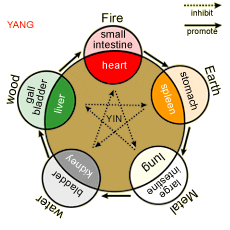Etiological or Causal Factors in TCM
The five elements and their relationships with the body's organs

Modern medical science attempts to isolate purely physical factors as the cause of disease, external factors such as bacteria and viruses, chemical compounds and other are well identified for most illnesses. From a TCM view, it can relieve the symptoms rapidly if applying treatment to clear the external causes, but it is unlikely to beneficial the overall body and achieve a full recovery. The Chinese view many of these "causes" merely as part of the triggering factors for disease development; as a certain organ is weak and unable to resist outside invasion, it is therefore prone to attack by an outside agent. Killing the agent eliminates the immediate threat but does nothing to restore the body's own resistant and healing abilities, so it is only a matter of time before it succumbs to another attack. TCM attributes the various causes of diseases to external and internal origins. These factors conform and act according to the principles of yin yang and five elements, in which both stress balance and inter-relationship.
The external causes of disease are called the "Six Evils" which are often governed by the environmental conditions like season and climate, while the internal factors are called the "Seven Emotions" which are mainly affected by our mental or emotional response to different situations. Ancient scholars had summarized and categorized disease causes in the Plain Questions, in which states: "Pathogenic evils either originate in yin or originate in yang; those coming from yang are related to wind, rain, coldness and summer heat; those coming from yin are related to improper diet, unhealthy lifestyle and extreme emotions."
See the five elements and their relationships with nature and the body


